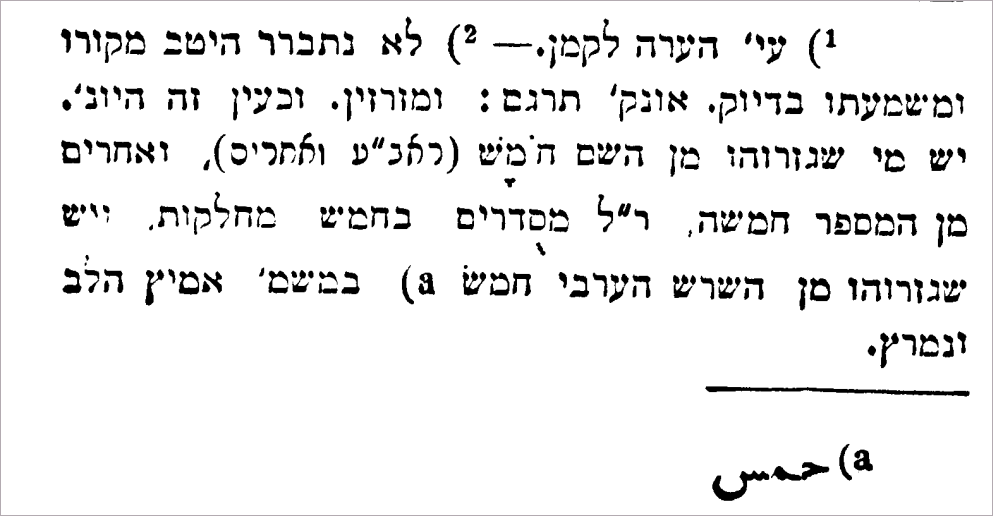Hamas - Etymology and Hebrew Cognates
Israel is still grieving and reeling from the barbaric massacre carried out by the terrorist organization Hamas on Simchat Torah. And now we are about to read Parashat Noach, which describes the terrible state of humanity before the flood:
וַתִּשָּׁחֵת הָאָרֶץ לִפְנֵי הָאֱלֹהִים וַתִּמָּלֵא הָאָרֶץ חָמָס׃
"The earth became corrupt before God; the earth was filled with violence." (Bereshit 6:11)
This has led many to wonder - is there a connection between the word for violence in Hebrew - hamas - and the Arabic name of the violent organization Hamas?
Let's look at each of these words. The Hebrew root חמס means "to do violence, to wrong, to rob." Klein says that it might be the source of the name of one of the unkosher birds mentioned in Vayikra 11:16 and Devarim 14:15 - the tachmas תַּחְמָס, presumably because it is a bird of prey. Another such animal is the hamos חָמוֹס - a ferret, or weasel. Klein doesn't include it as an entry in his dictionary, but the Even-Shoshan dictionary does connect its name to the root חמס. Even in English the name "ferret" comes from a Latin word meaning "thief."
The name of the terror group Hamas, on the other hand, is an acronym. Here's the etymology from the Wiktionary entry for Hamas:
an acronym for حَرَكَة اَلْمُقَاوَمَةِ الْإِسْلَامِيَّةِ (ḥarakat al-muqāwama l-'islāmiyya, “Islamic Resistance Movement”).
(In Hebrew, this is even more clear, with its spelling חמאס).
But that choice of acronym was influenced by the Arabic word حَمَاس ḥamās, which means "enthusiasm, zeal."
Does this Arabic word have any Hebrew cognates?
According to scholars, there might be in one meaning of the Hebrew root חמש. Here's what Gesenius writes:
We've discussed this root in the past:
The Hebrew word for the number five is חמש - chamesh. Another set of words that would seem to have the same root are chamush חמוש - armed and tachmoshet תחמושת - ammunition. Is there a connection between them?
The earliest source that might provide an answer is Shemot 13:18 - וַחֲמֻשִׁים עָלוּ בְנֵי-יִשְׂרָאֵל, מֵאֶרֶץ מִצְרָיִם. "Bnei Yisrael went up, chamushim, from the land of Egypt". Most translators and commentaries explain chamushim here as meaning "armed."
In that post, I didn't mention then any connection to the Arabic root meaning "zeal." However, I found now a significant source that supports this connection: the Aramaic translation of Onkelos, who renders the phrase as:
וּמְזָרְזִין סְלִיקוּ בְנֵי יִשְׂרָאֵל מֵאַרְעָא דְּמִצְרָיִם
According to Sokoloff (in his Dictionary of Jewish Babylonian Aramaic), the Aramaic root זרז essentially means "to arouse, strengthen." He then provides three usages (with examples): one meaning "to arouse, encourage," a second meaning "to arm," and the third "to strengthen." (See similar cases in Jastrow.)
How should we understand the usage by Onkelos here? Rashi (certainly according this translation) understands the Aramaic root זרז as meaning "armed" in this case. R. Aryeh Kaplan in The Living Torah, on the other hand, explains the Targum as "with eagerness" or "with enthusiasm."
It seems to me that even if Onkelos did mean "to arm" in this case, the overall association of זרז with enthusiasm (even in terms of being armed) confirms that Onkelos associated this usage of חמש with the same meaning of hamas in Arabic (which therefore may have been present in the related Aramaic as well.)
The connection between the Arabic hamas and this particular use of חמש is also noted in footnote 2 in the Ben Yehuda dictionary for חמש (as armed):
I find it convincing. As we've previously discussed regarding the word hamsin, the Hebrew חמש becomes hams in Arabic.
As far as the claim by Gesenius of a link to other roots like חמץ and our focus, חמס, to a more general sense of "sharpness: well, that depends on how far we are willing to connect different roots that begin with the same two letters. It's certainly possible that חמש, חמץ and חמס are related (and I could even consider additional roots like חמד - "to covet", which is linked to robbing in Shemot 34:24), but I would need to see more research on the subject.
For now, I just pray that this prophecy will come true very soon - both regarding Hamas and חָמָס:
לֹא־יִשָּׁמַע עוֹד חָמָס בְּאַרְצֵךְ
"Violence [hamas] shall no more be heard in your land..." (Yeshaya 60:18)



No comments:
Post a Comment